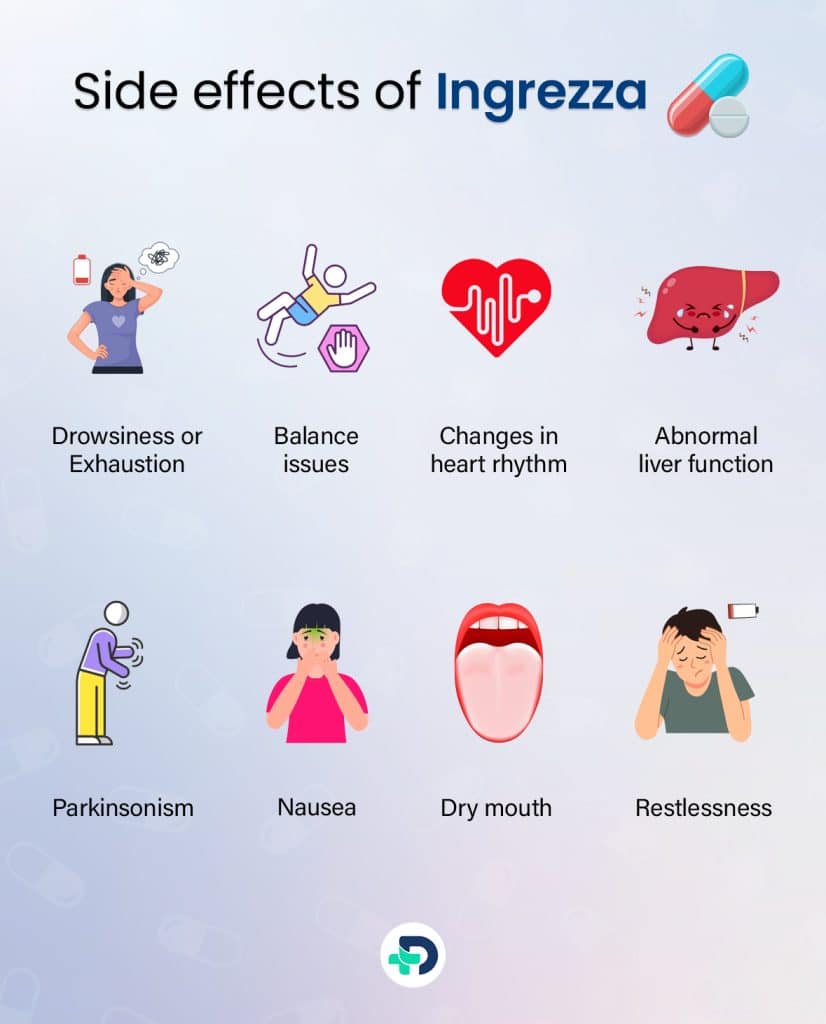Ingrezza: Uses, Side effects, and Precautions

- Ingrezza
- 22 Aug 2023
Overview
What is Ingrezza?
Ingrezza is used to treat a disorder known as tardive dyskinesia (TD). It is a neurological condition marked by uncontrollable and repetitive movements of the tongue, face, and other body parts. These movements—often called “tics” or “jerks”—can be highly upsetting and disruptive to the individuals who experience them.
This article delves into the fascinating background of this medication, examining its mode of action, clinical efficacy, and effects on patient outcomes.
We will also discuss its crucial role in treating tardive dyskinesia, relieving countless sufferers of this puzzling and frequently stigmatized disorder.

Drug Class
It is a member of the group of medications called vesicular monoamine transporter (VMAT2) inhibitors. When certain neurotransmitters, like dopamine, are packaged into vesicles and released into the spaces between nerve cells, the protein VMAT2 is discovered in nerve cells.2Overview| Researched based study from Nlm.nih.gov
Ingrezza mechanism of action
- It functions by assisting in regulating the brain’s dopamine levels. Dopamine is in charge of communicating between nerve cells. Dopamine overproduction in the brain can cause uncontrollable movements.
- This medication lessens dopamine release, which helps control aberrant activities and calm them down. Managing this can aid in easing TD symptoms, allowing patients to move more regularly and pleasantly.1Overview| Researched based study from Fda.gov ,2Overview| Researched based study from Nlm.nih.gov
Uses
Uses of Ingrezza
As previously indicated, it is primarily used to treat tardive dyskinesia (TD). Let’s examine its applications and advantages in more detail:
- Tardive dyskinesia(TD)
- Dopamine regulation
- Symptom management of TD
Tardive dyskinesia
- Uncontrollable and repetitive movements of the face, tongue, and other body parts are the hallmarks of this condition. Some people who have received treatment with certain psychiatric medications, particularly antipsychotic drugs that affect dopamine receptors, may experience this side effect.
- This medication offers assistance by reducing them.
Dopamine control
- A vesicular monoamine transporter inhibitor, the active component, updates certain neurotransmitters, including dopamine, into nerve cells.
- Ingrezza helps control dopamine levels in the brain by suppressing VMAT2. This is important since it is thought to be related to dopamine dysregulation in the brain, and its activity aids in redressing this imbalance.
Symptom Management of TD
- While it doesn’t treat the underlying cause, it is essential in treating the symptom. Reducing uncontrollable movements can enhance a patient’s motor function, general functioning, and quality of life.
The US Food and Drug Administration has expressly approved it as the first and only therapy for treating tardive dyskinesia, making it unique. Its acceptance represented a critical turning point for the medical industry because it addressed the need for efficient treatment.1Uses| Researched based study from Fda.gov
Dosage
Dosage and storage
- Adults should typically start with a dosage of 40 mg once daily. It can be changed to fit a person’s needs and medical background.
- You must follow the directions on the prescription strictly. Never change the dosage, stop taking the medicine, or increase it without seeing your doctor.
- At room temperature (between 20 and 25 degrees Celsius), the pills can be stored dry. Keep the medication out of the sun, dampness, and heat. It shouldn’t be kept in the bathroom or any other area with a lot of humidity.2Dosage| Researched based study from Nlm.nih.gov
Side effects

Ingrezza side effects
Although it may be a helpful treatment, it does have side effects, just like all other medications. The degree of these side effects might vary from person to person, so it’s essential to be aware of them and discuss them with a medical expert before beginning treatment.
Common adverse effects include:
- Sleepiness or fatigue
- Balance problems
- Changes in heart rhythm
- Parkinsonism
- Restlessness or Akathisia
- Nausea
- Dry mouth
- Abnormal liver function
Drowsiness or exhaustion
- While taking it, some individuals may feel tired or too exhausted. Refraining from alertness-demanding occupations like operating heavy machinery or driving is vital until you understand how the medicine affects you.
Balance issues
- May result in balance problems that make you shaky or make walking difficult.
Changes in heart rhythm
- It can occasionally alter the heart’s electrical activity, resulting in a condition known as QT prolongation. This may result in significant irregular heartbeats (arrhythmia), so your doctor may order an ECG to evaluate your heart’s electrical activity before beginning medication.
Parkinsonism
- Parkinson’s disease symptoms, like slower movements, rigidity, and a shuffling gait, can occur in certain persons.
Restlessness or akathisia
- Rarely, it may result in akathisia, a condition where a person feels agitated.
Nausea
- As a side effect, nausea or stomach discomfort could happen.
Dry mouth
- Some persons who use this drug could suffer from dry mouth.
Abnormal liver function
- It could be expensive for your doctor to monitor changes in liver function through blood testing.1Side effects| Researched based study from Fda.gov
Precautions
Warnings and Precautions
Medical history
- Your medical condition should be disclosed to your doctor, especially heart-related ones. Abnormal heartbeats or a family history of cardiovascular disease might bring out any past depression related to Parkinson’s disease. suicidal ideas, liver issues, or a history of adverse drug reactions
Current medicines
- List all of the drugs you are presently taking, including prescription, over-the-counter, and dietary supplements.
Allergies
- If you have an allergy to valbenazine (Ingrezza) or any other drug ingredients, tell your doctor right away.
Both breastfeeding and pregnancy
- Discuss the benefits and drawbacks of taking a medication with your doctor if you are pregnant or want to become pregnant.
Driving as well as operating equipment
- Some people may experience tiredness or vertigo as a result. Before performing activities that call for attentiveness, you must understand how it affects you, such as operating heavy machinery or driving.
Alcohol and sedatives
- Drinking alcohol while taking it increases the risk of sleepiness and impairs motor function. Describe to your doctor any sedatives or tranquilizers you are taking as well.
QT prolongation
- The heart’s electrical activity may vary as a result. If you have a history of heart issues or are on any medications that could lengthen your QT interval, let your doctor know.
Liver function
- It may impair liver function, so your doctor may check your liver health with blood tests while you’re receiving therapy.1Precautions| Researched based study from Fda.gov
Drug interactions
Ingrezza Drug Interactions
Strong CYP3A4 inhibitors
- The CYP3A4 enzyme in the liver is principally responsible for its metabolism. Potent CYP3A4 inhibitors, such as ritonavir, clarithromycin, and ketoconazole, can raise the level of the medication in the blood. The chance of adverse consequences could increase as a result. Your doctor may need to adjust the dosage if you take these medications at the same time.
Medicines that prolong the QT
- Ingrezza might alter the heart’s electrical activity, which could prolong QT. Combining it with additional medications, such as some antipsychotics, antidepressants, and antibiotics, which also lengthen the QT interval, may raise the chance of an irregular heartbeat.
Digoxin
- Digoxin levels in the body can rise when Ingrezza is used concurrently, which may raise the risk of exposure-related side effects. In concurrent use, it is crucial to monitor the drug concentration.1Drug interactions| Researched based study from Fda.gov
Any feedback on this article?
 This Articles content was accurate
This Articles content was accurate Very Informative Article
Very Informative Article I have a question or a comment
I have a question or a comment
 This article contains inaccurate content
This article contains inaccurate content This article was not helpful
This article was not helpful I have a question or a comment
I have a question or a comment
We appreciate your helpful feedback!
Checkout our social pages
References
-
FOOD AND DRUG ADMINISTRATION
Ingrezza | Uses | Mode of action | Side effects | Precautions Interaction
-
National Library of Medicine
Valbenazine (Ingrezza) | Overview | Dosage | Storage






































